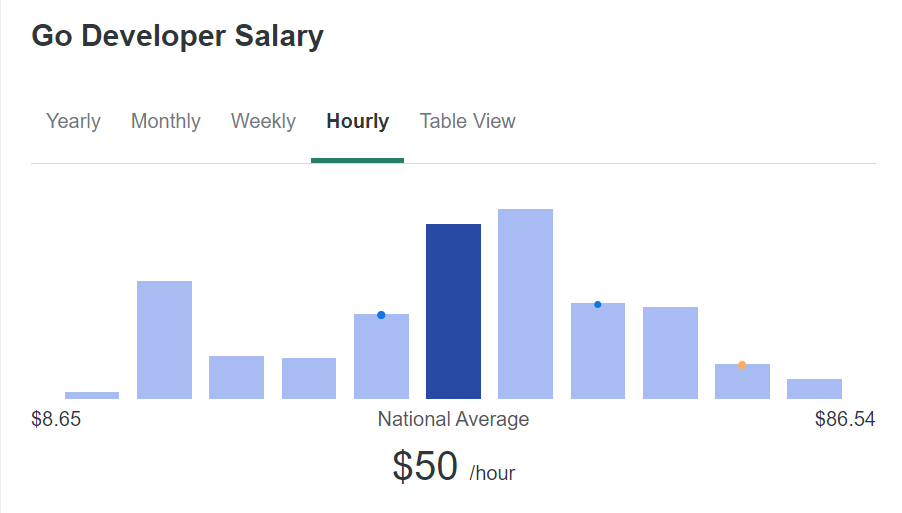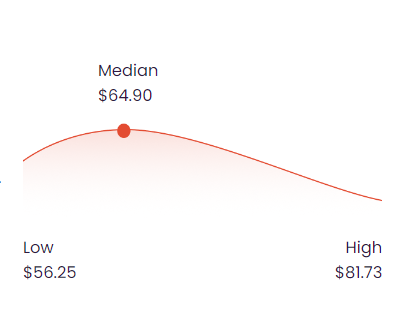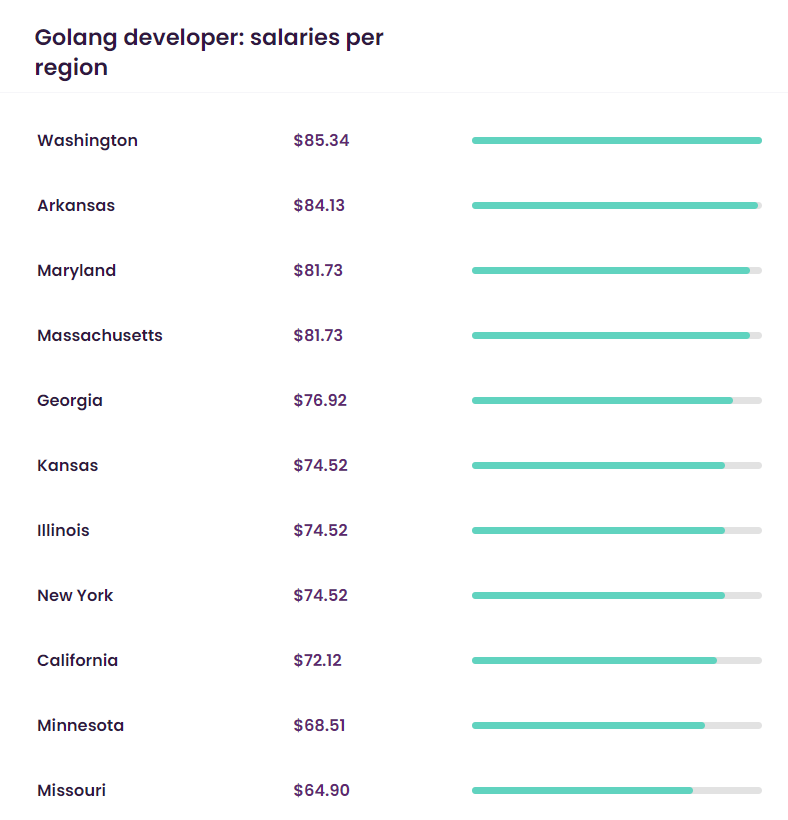Pricing Tech Talent: Your Guide to Go Developers’ Hourly Rates in 2023
Golang Developers in the United States, on average, earn an hourly rate of $58. However, this figure varies among individuals, as data from ZipRecruiter indicates. While the majority fall within a pay range of $50 to $70, those at the top, specifically in the 90th percentile, can expect to earn as much as $80 per hour. This disparity in earnings can be attributed to factors such as experience, specialization, and geographical location.
Table of Contents
Understanding the current market rates for hiring Golang developers is a vital step for any business planning to use Go for their projects in 2023. This guide provides a detailed understanding of the factors determining Golang developers’ hourly rates, enabling informed decisions when looking to hire Golang developers.
Golang Developer Hourly Rates Based on Experience
Experience significantly impacts the hourly rates for Golang developers. Entry-level developers, ideal for simpler tasks, charge between $20 to $38 per hour. Mid-level developers, who balance cost and experience, typically ask for $35 to $81 per hour. Senior-level developers, experts in Go, can command between $65 and $127 per hour.
| Experience Level | Average Hourly Rate |
|---|---|
| Entry-Level | $20 - $38 |
| Mid-Level | $35 - $81 |
| Senior-Level | $65 - $127 |
However, the above figures vary among individuals, as data from ZipRecruiter stats indicate below. While the majority fall within a pay range of $38.22 to $61.06, those at the top, specifically in the 90th percentile, can expect to earn as much as $80 per hour. This disparity in earnings can be attributed to factors such as experience, specialization, and geographical location.

Geographically-Influenced Hourly Rates for Go Developers
The hourly rates for Golang developers differ globally, influenced by factors such as living costs, market demand, and economic conditions. In North America, rates are highest in the United States. South America sees slightly lower rates.
North America
| Country | Average Hourly Rate |
|---|---|
| United States | $52 - $80 |
| Canada | $46 - $57 |
| Mexico | $38 - $48 |
South America
| Country | Average Hourly Rate |
|---|---|
| Brazil | $39 - $50 |
| Argentina | $37 - $45 |
| Venezuela | $38 - $47 |
Western Europe
| Country | Average Hourly Rate |
|---|---|
| United Kingdom | $50 - $64 |
| Germany | $48 - $60 |
| Switzerland | $50 - $70 |
Eastern Europe
| Country | Average Hourly Rate |
|---|---|
| Ukraine | $38 - $47 |
| Poland | $39 - $48 |
| Hungary | $37 - $46 |
Asia
| Country | Average Hourly Rate |
|---|---|
| Japan | $48 - $60 |
| India | $25 - $40 |
| Sri Lanka | $22 - $38 |
| Malaysia | $35 - $46 |
| China | $35 - $50 |
| Bangladesh | $23 - $40 |
Other Countries
| Country | Average Hourly Rate |
|---|---|
| Australia | $51 - $63 |
| United Arab Emirates | $48 - $58 |
| South Africa | $15 - $32 |
Statistics from talent.com suggest that even in the United States, the salary obtained by Golang developers varies according to the state. The highest salary is obtained by developers in Washington followed by developers in Arkansas, Maryland, Massachusetts, Georgia, Kansas, Illinois, New York, California, and Minnesota coming in tenth place.
Further, talent.com details that in the United States, the average hourly rate for a Golang developer is $64.89 per hour. Entry-level positions start at $55.61 per hour, while the most experienced workers can earn up to $80.29 per hour.


Engagement Models and Their Impact on Golang Developer Hourly Rates
Golang developer rates vary greatly across different hiring models. Traditional in-house developers often command higher salaries due to benefits, taxes, and office costs, but offer close communication and cultural alignment. Outsourcing offers flexibility and cost savings, especially for short-term projects or niche skills, but rates depend on the outsourcing firm’s location and reputation.
Freelancers provide a flexible, often cost-effective option, charging per project or hour, but may require more management. Hybrid models blend in-house and outsourced talent, enabling companies to retain core skills in-house while outsourcing specialized roles.
Remote Golang developers offer savings on office costs and access to global talent but require solid remote management and communication structures. Startups should consider their specific needs, budget, and long-term plans when selecting a hiring model.
| Engagement Model | Average Hourly rate |
|---|---|
| In-house | $48 - $90 |
| Outsourcing | $30 - $63 |
| Freelancers | $50 - $80 |
| Hybrid | $40 - $90 |
| Remote | $15 - $80 |
Golang Developer Hourly Rates Against Other Technologies
The relationship between Golang and certain technologies is significant. Developers who have specialized in these related technologies can offer enhanced services and therefore command higher rates. These areas of specialization can be an advantage to projects requiring more than just Golang proficiency. Thus, when hiring, it’s essential to consider not only the developers’ proficiency in Golang but also their expertise in these associated technologies. The expected hourly rates for these additional skills can reflect their market demand and the value they bring to complex projects.
Programming Languages
| Programming Language | Average Hourly Rate |
|---|---|
| Node.js | $40 - $70 |
| TypeScript | $45 - $75 |
| Rust | $55 - $90 |
| Ruby | $50 - $80 |
| Java | $45 - $75 |
| Python | $40 - $70 |
Database Technologies
| Technology | Average Hourly Rate |
|---|---|
| Cassandra | $55 - $90 |
| MongoDB | $45 - $75 |
| MySQL | $40 - $70 |
| NoSQL | $50 - $80 |
| PostgreSQL | $55 - $90 |
| Redis | $50 - $80 |
Web Development Frameworks/Libraries
| Web Development Frameworks | Average Hourly Rate |
|---|---|
| Vue.js | $40 - $70 |
| React.js | $45 - $75 |
Cloud Technologies
| Technology | Average Hourly Rate |
|---|---|
| Azure | $60 - $100 |
| AWS | $60 - $100 |
Infrastructure and DevOps
| Infrastructure / DevOps | Average Hourly Rate |
|---|---|
| Docker | $55 - $90 |
| Kubernetes | $60 - $100 |
| Terraform | $60 - $95 |
| LINUX | $50 - $80 |
| DevOps | $60 - $100 |
Specialty Technologies
| Technology | Average Hourly Rate |
|---|---|
| AI (Artificial Intelligence) | $60 - $120 |
| Blockchain | $70 - $120 |
| gRPC (Google Remote Procedure Call) | $55 - $85 |
| Elasticsearch | $50 - $80 |
| SaaS (Software as a Service) | $60 - $100 |
| FinTech (Financial Technology) | $60 - $100 |
Testing and Architecture
| Testing / Architecture | Average Hourly Rate |
|---|---|
| TDD (Test-driven development) | $50 - $80 |
| Microservices | $55 - $95 |
Microservices Query Languages
| Query Language | Average Hourly Rate |
|---|---|
| GraphQL | $50 - $80 |
Conclusion
Choosing the right Golang developer for your project requires more than just understanding the cost. In the vast talent pool of 2023, you’ll find a wide range of hourly rates for Golang developers. These rates are influenced by several factors such as their experience level, geographical location, and the complexity of the project at hand. Although hourly rates are a crucial consideration, it’s important to focus on the value that a skilled and dedicated Golang developer can bring to your project rather than just the cost.
Having a clear understanding of the landscape presented in this guide will better equip you to make an informed decision when you hire Golang developers. Always keep communication channels open and maintain transparency about your expectations to ensure a fruitful partnership and successful project completion. You can check out our Golang Developer Annual Salary Guide to learn about the annual salary rates you can earn in the US and across the world. We bring you a complete Golang Developer Hiring Guide along with the Golang Developer Job Description and Golang Interview Questions guide which will help you in the process of hiring a Shopify developer in 2023.
Table of Contents






